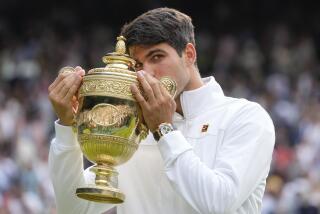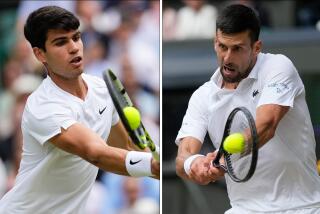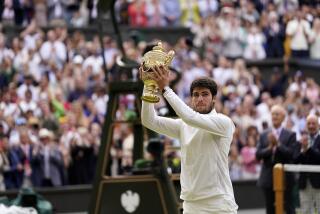Edberg Is on Top the Hard Way : Wimbledon: Swede takes a two-set lead, then loses it and is on the ropes before winning his second title by beating Becker in five sets.
WIMBLEDON, England — Boris Becker saw his trophy pass before his eyes and given to longtime rival Stefan Edberg, who on a sunny Sunday afternoon at Wimbledon found that this really is his year.
“I thought all along this was my time--I knew I could win,” Edberg said.
The 24-year-old Swede with the personality of oatmeal and the tennis game of an extrovert, won his second Wimbledon title in three years.
He beat Becker in their third consecutive Wimbledon final, coming back from 1-3 in the fifth set to score a 6-2, 6-2, 3-6, 3-6, 6-4 decision over last year’s champion.
“The first one is always very special, but this one is very special too,” Edberg said, revealing little as usual.
When Becker blooped a service return off the court on match point, he climbed over the net and threw his arms around Edberg. Then, a bit later, Becker watched as Edberg held the silver Wimbledon trophy aloft.
“I know now how it feels both ways,” said Becker, who defeated Edberg in last year’s final and lost to him in the 1988 final. “With Stefan, we’ve been going through so much together. Some tough ones, some easy ones.
“I was just thinking that I know how it feels to win it, and I know how it feels to lose it against the same guy.”
Edberg hit a ball into the stands at the end of the match. He pulled off his shirt and threw it into the stands. He took another shirt out of his bag and thew that into the stands, too.
But Edberg held the Wimbledon trophy tightly, perhaps remembering how it had nearly slipped through his grasp.
He probably shouldn’t have won. When Becker led, 3-1, in the fifth set, all the West German had to do was serve out the match. Facing Becker’s serve, one of the most powerful weapons in tennis, was a daunting prospect, said Edberg’s coach, Tony Pickard.
“Let’s face it, at 3-1 it was over,” Pickard said. “But I’m telling you (Edberg) has fire in his belly. He could have folded and gone home. He proved to everybody he’s a great champion.”
At first, it seemed as if it would be easy for Edberg, who took the first two sets in only 56 minutes. Becker spent the time back on his heels, trying to catch up with Edberg’s serve.
Becker said he was reeling from the effects of his other six matches, especially his difficult four-set semifinal victory over Goran Ivanisevic.
Said Becker: “I guess the last six matches paid its toll. . . . I had to go to the border.”
And down 2-6, 2-6?
“I was just hoping, you know, I want one set at least,” Becker said.
He got two. Becker saved a break point in the first game of the third set with a deft touch volley into an open court, then broke Edberg in the second game with a backhand service return crosscourt.
Becker evened the match by winning the fourth set, taking advantage of Edberg’s double fault in the second game. At break point, Becker blasted a service return at Edberg, who popped the volley long.
He didn’t know it when the fifth set began, but Becker had history going against him. Not since France’s Henri Cochet in 1927 had anyone won a Wimbledon final after losing the first two sets.
But Becker was on the verge of beating the percentages when he took a 3-1 lead. Edberg lost the third game when he double-faulted on game point and double-faulted again on break point.
Becker made a quick assessment of his chances. “I knew I only had to hold my serve to win it,” Becker said. “And if I had made it 4-1, it would be a different story.”
Edberg edited the outcome when he broke back in the next game, then evened the match at 3-3 by holding serve.
“If it would have gone to 4-1, it would have been tough,” Edberg said. “I knew I had to break back immediately.”
Serving at 4-4, Becker fell behind, 15-30. Unsure of his serve, Becker took some pace off his first attempt, just trying to get it in play, and Edberg returned it at the level of Becker’s feet. Becker took the ball in the air but put a forehand volley in the net.
“He made an easy mistake,” Edberg said. “It really let me in the match again. That’s where it changed.”
Edberg broke Becker at 30-40 with a topspin lob that landed behind the defending champion and bounced away into the shadows of Centre Court.
At 5:04 p.m., leading, 5-4, Edberg served for the match. Four minutes later, it was over, but it will probably start again when Edberg and Becker set foot on Wimbledon’s grass courts next year.
One or the other has been champion five of the last six years, the only aberration to the pattern being Pat Cash’s victory in 1987.
There were certain values placed on the match. Edberg won $404,800 to Becker’s $202,400 and probably will replace Becker as No. 2 in the rankings today.
“We really are the two challengers to (Ivan) Lendl’s No. 1 spot,” Edberg said. “It has been a great challenge so far, and I think it will go on for many years to come. After what happened in the French Open, you know, this feels really, really good.”
The chance to repeat his 1988 victory over Becker in the Wimbledon final seemed remote after Edberg lost in the first round in the French Open. He was devastated by the defeat, but Pickard told him to put it out of his mind.
So Edberg and Pickard agreed on a new strategy, one they hoped would help him win Wimbledon.
“Paris was over,” Pickard said. “It’s like history. What happened today, this is our history now.”
More to Read
Go beyond the scoreboard
Get the latest on L.A.'s teams in the daily Sports Report newsletter.
You may occasionally receive promotional content from the Los Angeles Times.










